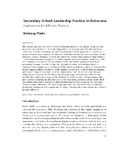Secondary school leadership practice in Botswana: implications for effective training

View/
Date
2008-01Author
Pheko, B.C.
Publisher
SAGE Publications. http://ema.sagepub.comType
Published ArticleMetadata
Show full item recordAbstract
This article analyses the views of selected headteachers on the impact of the 10-year
basic education policy on the leadership skills of secondary school headteachers in
Botswana. Research literature on school leadership and management in Botswana is
sparse. Despite this, demands for effective leadership in schools have continued as the
education system changes. In 1996, the Botswana Government started to implement a
10-year basic education programme, which rapidly increased student numbers at both
community junior and senior secondary schools and building projects for school
expansion became the order of the day. Secondary school headteachers have to
manage these changes. A central focus of this article is their perceptions of the practice
used to appoint them, leadership skills required for the post, their leadership training,
and how training for leadership can be improved to meet the educational changes.
Using results of the interview data collected from eight selected secondary school
headteachers, this article exposes the limitations of the practice and procedures that
are used in appointing headteachers to school leadership position and the established
procedures intended to develop a skilled leadership force in secondary education to
ensure quality education. The article highlights the need for Botswana to establish a
leadership training policy to guide the training of headteachers and ensure that schools
become effective.
